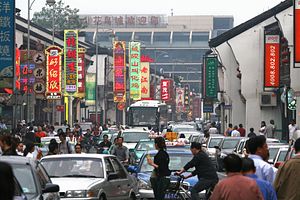In Chengdu this past Monday, a traffic violation led to an act of brutal violence and then became a national news story that ended with many Chinese citizens supporting the attacker.
It all began when a young woman named Lu Yang abruptly changed lanes to avoid missing her exit, thereby cutting off another driver, later identified as Mr. Zhang, who was then forced to slam on his brakes. Zhang was with his wife and infant child, and the sudden stop caused his child to begin crying. He followed Lu off the main road, overtook her, and then cut her off as she had done to him. A few hundred meters later, Lu overtook Zhang again, driving him into the bicycle lane and almost forcing him to hit a pedestrian.
“Don’t you know how to drive?” he yelled as he drove past her, shouting an expletive at her. He then overtook her and immediately slowed down. Having made his point, he sped back up again. A little later, however, Lu was back. They drove side by side for a stretch until Zhang told her to pull over, then he cut her off, forcing her to stop her car underneath the Jiaozi overpass, where he hopped out of his vehicle, went over to Lu’s window, reached inside to unlock the door, then dragged her out of her car and began savagely beating her and stomping on her face. Ms. Lu was taken to a hospital where she was diagnosed with a cerebral concussion, several broken bones and severe bruising.
Zhang’s dashcam video of the road chase, here, as well a dashcam video of the attack, here, both went viral. The story received ample national coverage on CCTV1 and was also picked up by South China Morning Post, BBC Chinese, International Business Times, and others. At first, when only footage of the attack was available, public sentiment was sympathetic toward Lu. However, once footage of the chase was released, many began to argue that she had got what she deserved.
“If you drive like that,” one person told me, “you’re asking to be punished.”
“But don’t you think police should handle matters like this?” I asked.
“It’s unrealistic to expect police to handle such cases. There are too many people in China.”
Much of the CCTV1 coverage supported the view that while Zhang’s actions were wrong, Lu was also to blame. Some reports even focused more on her transgressions than his. A young businessman from Henan told me he thought this was the government’s attempt to moralize unlawful drivers.
“They’ll throw him in jail,” he said, “but the government won’t miss an opportunity to preach to the people. It’s easier than hiring an army of traffic police.”
Public support for Lu fell after her parents were interviewed. Her mother gave the implausible explanation that Lu had been driving so recklessly because she was in a hurry to go do some charity work, while her father claimed his daughter was an absolute innocent who had done no wrong and broken no laws.
One young office lady told me that although it was wrong to physically attack people in this way, Ms. Lu was the real villain in all this.
“She could’ve hurt someone,” she said. “And she was an awful person too. She had a lot of boyfriends.”
It turns out that the renrou sousuo, or “human flesh search engine,” the process by which Internet users disseminate private information regarding corrupt officials, celebrities, or individuals like Ms. Lu, had released her hotel records, revealing over 80 visits in one year. Several of the people I spoke to brought this up. By the end of the week, the tide of opinion seemed to have settled. It was eerie to see how easily the media manipulated public opinion and how little people questioned what they were told. Everyone I spoke to was now repeating the same platitude, almost verbatim: “They both were wrong.”
Not everyone followed the tune though. Today another person repeated the businessman’s theory that the media’s focus on Lu was an attempt to teach Chinese people a lesson. He quoted an old expression, sha ji jing hou, or “kill the chicken to scare the monkey,” arguing that the government should be focused less on preaching and more on finding solutions.
“This is a story of two unhappy people,” he said. “Unhappy people drive like that and unhappy people react to bad driving like that. A lot of Chinese people are unhappy these days. Lack of freedom, inequality. We don’t need the government to make examples of us. The monkey doesn’t need to be scared. The monkey just needs to be left alone.”

































